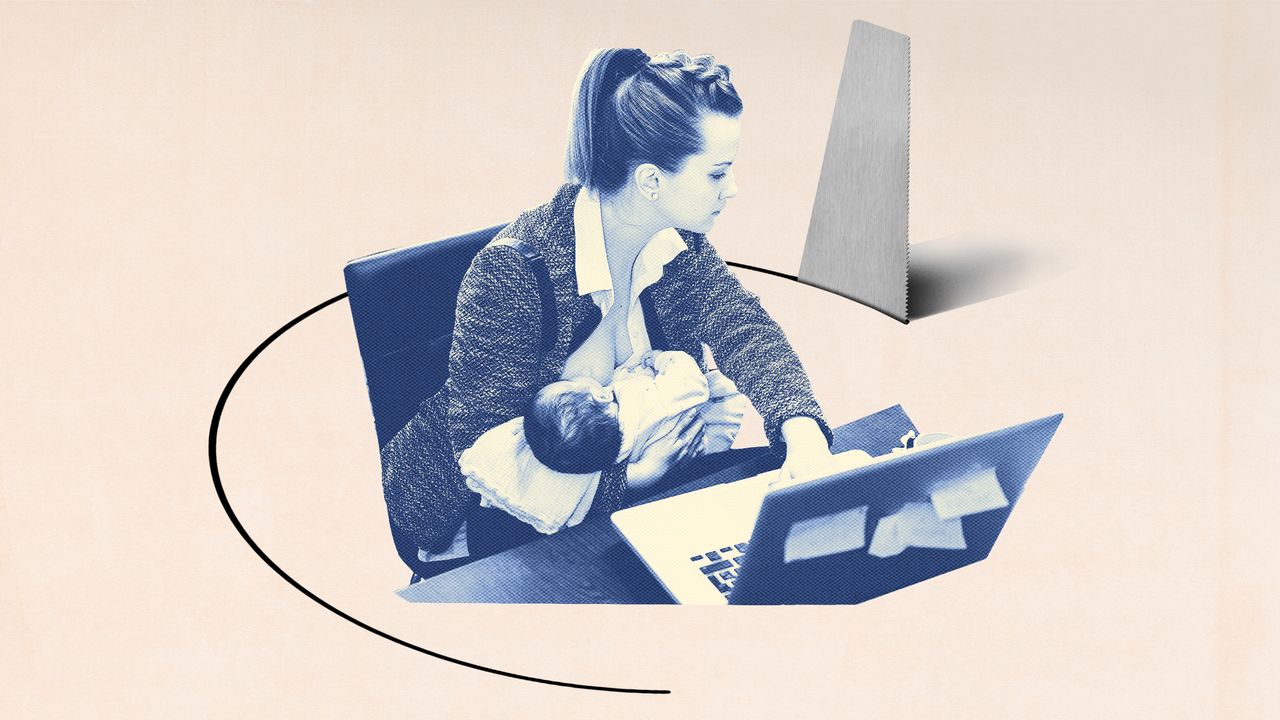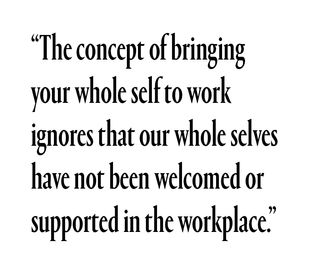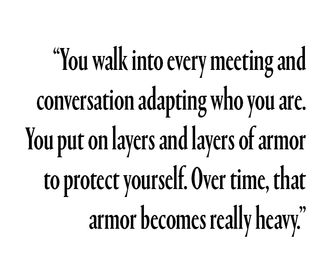Is Bringing Your Whole Self to Work a Trap?
The idea of being more \201cauthentic\201d in the workplace has become increasingly popular. But for mothers, it can come with consequences.


The death of the Work Voice—that slightly sing-songy, totally fake tone most often used with co-workers, clients, and managers—happened a few years ago when TikTokers jumped on the trend of using their “real voices” versus their “customer service voices.” The viral demonstration seemed like a challenge to the buttoned-up ways people felt pressured to present themselves at work during a time when so many people were clocking in from home. When pandemic puppies and meetings from bedrooms and awkward roommate cameos reminded bosses their employees were people.
But the rise of professionals opting to be more authentic at the office is part of a broader movement that began, at least in part, in 2018 when the book Bring Your Whole Self to Work by TEDx talker and corporate consultant Mike Robbins was published. The premise of the text centers on the idea that professionalism is a construct that forces workers to inhabit personas that suppress aspects of themselves in order to fit into the workplace. Many companies, especially those in the tech sector, became some of the authenticity movement’s biggest acolytes. And just like that, we started friending our managers on social media; our colleagues became family.
Which sounds good. Except that for many people—especially those from underrepresented communities—openly sharing their full lives in the workplace can open them up to bias. “The concept of bringing your whole self to work ignores that our whole selves have not been welcomed or supported in the workplace,” says Daphne Delvaux, an attorney whose San Diego-based law firm Delvaux Law is focused on protecting women at work. “My days are filled with calls from people who dared to show their whole selves at work and found themselves fired. Whether their whole selves encompass pregnancy, caretaking responsibilities, disability restrictions, or age, employers routinely prefer unencumbered workers. Ignoring this reality is naive at best, and legally reckless at worst.”

For mothers, this is woefully true. There is a “pervasive anti-motherhood bias in the workplace,” says Delvaux. It’s often referred to as the “maternal wall.” Just look at pay disparities: in households where both parents of school-age children are working full-time, the mother makes 73 cents for each dollar a father makes, according to data from the U.S. Department of Labor. That’s larger than the overall gender wage gap of 83 cents per dollar. And in a 2021 study from London South Bank University, pregnant women reported missing out on promotions and pay raises, and being subjected to microaggressions from colleagues who questioned their competency, which included making comments about their “pregnancy brain.”
Moms we’ve spoken with have reported how their pregnancies have made some co-workers tense or uncomfortable. One recalled returning to work after parental leave, only to find her manager blatantly reading a book titled Childfree by Choice right before their first meeting. Such encounters make it harder for mothers to feel safe enough to allow themselves to be truly seen.
“Authenticity, on its face, it’s such a positive thing,” says Erin Thomas, Ph.D., head of diversity, inclusion, & belonging at Upwork, the global hiring marketplace. But critical nuance is left out of these shiny one-liners and that can lead to misinterpretation, she adds.

Tricia Montalvo Timm, a Latina executive, lawyer, board director, and mother of two daughters, says she’s dealt with this dilemma for decades. “Hiding who I was as a working mother, hiding my cultural heritage—all of that takes a huge emotional toll,” says Timm, who works in Silicon Valley. “It is both emotionally and physically exhausting.”
Stay In The Know
Get exclusive access to fashion and beauty trends, hot-off-the-press celebrity news, and more.
Every interaction became a calculus for her: Would mentioning her family vacation remind colleagues she’s a mother? Would she be seen as unreliable if she blocked out time to drive her kids to school each morning? “You walk into every meeting and conversation adapting who you are,” says Timm. “You put on layers and layers of armor to protect yourself. Over time, that armor becomes really heavy.”
The experience led Timm to write a book, Embrace the Power of You: Owning Your Identity at Work. Published in March of this year, it lays out her journey with diversity, equity, and inclusion advocacy and offers a road map for navigating identity issues in the workforce. “We all want to belong; it’s human nature,” says Timm. “But when you are the different one in the room, you feel like an outsider.”
But just because mothers (or anyone!) can’t always bring their full selves to work doesn’t mean they shouldn’t be able to. Lauren Smith Brody, CEO and founder of The Fifth Trimester, a book and now a gender equity consultancy, and co-founder of the Chamber of Mothers, a nonprofit that brings mothers together to advocate for their rights, stresses the power that employee resource groups (ERGs)—sometimes called affinity groups—can have in shaping company culture. ERGs have become popular since the pandemic, as employers have sought ways to maintain a sense of unity amid the rise of remote work.
While writing her book, Brody interviewed and surveyed nearly 800 mothers who all reported different versions of the same feeling: guilt. Some of it came from within—guilt about changing priorities, taking more days off work or not spending enough time with a new baby—but the guilt is external, too: Guilt from being constantly questioned about dedication to the job, availability, or taking family leave. “Everybody felt guilty,” says Brody. “Like nine times out of 10, it was because they thought something was wrong with them when really the system was not allowing them to succeed.”

By connecting in groups and spaces designed for vulnerability, workers can find shared successes, struggles, and the common denominators that become recommendations for systemic change within a company, explains Brody. And in the absence of robust federal legislation, these groups can have real power. Protections for working mothers are often at the hands of individual lawmakers, and the employers themselves, so it matters who has a voice within a company.
When workers find these peer groups, it can make all the difference. Raquel Gervasio returned to work after staying home for six years to care for her twins. She applied to Zoox, an Amazon subsidiary building robotaxis, which instituted a returnship program that offered extra steps to make sure she was welcomed back into the workplace and given support. That meant weekly check-ins with her manager where they addressed challenging topics, like what to do when feeling overwhelmed with mom guilt. “Having these conversations made me feel seen,” says Gervasio. She didn’t feel she had to hide, but could show up as her “true authentic self.”
But stories like Gervasio’s are not always the norm. And until companies create the type of systemic change that is needed to make sure everyone is free to be themselves, the onus remains on mothers to decide if they feel comfortable being as authentic as a child-free person. Often leaving them to question: Is the environment I’m working in safe? If I encounter resistance, do I have the tools and support to get through it? If the reception is not as I hope, what are my options? Can I show up to work today, as—me?

Michelle Eigenheer is a freelance journalist and communications specialist working in Louisville, Kentucky.
She lived in many places abroad before attending high school in rural Kentucky. She went to college at the University of Louisville, majoring in communications and graduating in 2015. During school, she worked for her school’s newspaper as a news editor, most notably leading reporting on infrastructure problems at the university. She also worked as a researcher and copywriter at a niche marketing firm focused on infographics. She then interned at Louisville.com, the online platform of Louisville Magazine.
Eigenheer wants to focus on writing about topics like urban development, as well as topics in urban agriculture and infrastructure. She is looking to write more for magazines and gain more experience in multimedia as she pursues her master’s in journalism at New York University.
-
 The Hottest Person You Know Is Probably Wearing This Unusual Perfume for Spring
The Hottest Person You Know Is Probably Wearing This Unusual Perfume for SpringThe season’s new signature scent.
By Ariel Baker Published
-
 Sydney Sweeney Glows in an Anti-Bridal Corset Dress
Sydney Sweeney Glows in an Anti-Bridal Corset DressThe newly single star looked snatched in Wiederhoeft.
By Hanna Lustig Published
-
 Princess Beatrice Is Following in the Footsteps of a Surprising Royal
Princess Beatrice Is Following in the Footsteps of a Surprising RoyalThe second-time mom has an incredible example in this regal figure.
By Kristin Contino Published